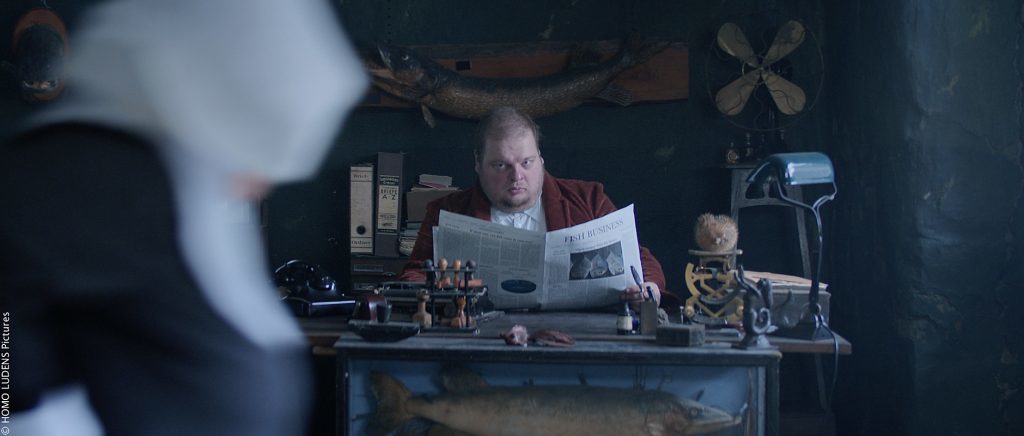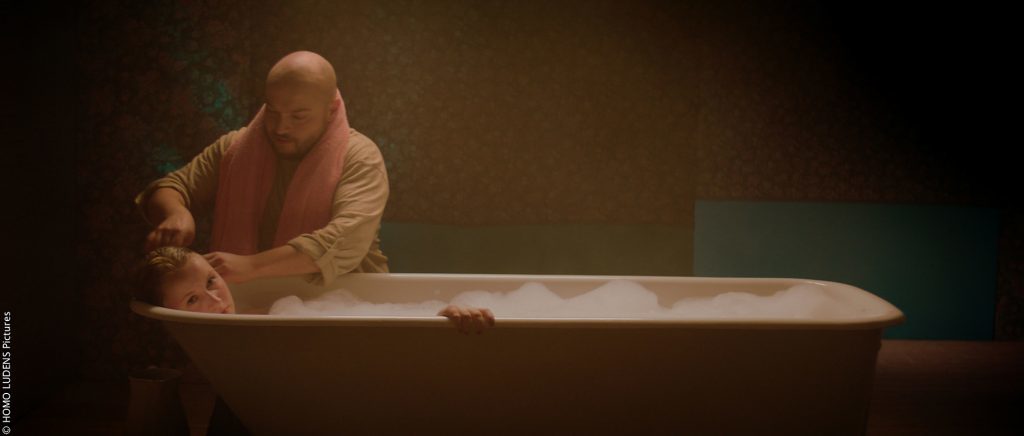
Case Study: Fishy Story
Filmmaker Aleksandra Szymanska talks about her short film.
Geplaatst op 5 maart 2018
Filmmaker Aleksandra Szymanska talks about her short film.
Geplaatst op 5 maart 2018Aleksandra Szymanska is a director and screenwriter, born and raised in Upper Silesia, Poland. Since 2001 she lives in Germany. She graduated from the Krzysztof Kieślowski’ Film School in Katowice and later the New York Film Academy in Los Angeles. Before she started making films, she worked for various TV productions in Germany and Poland, a. o. Das Erste, WDR, ZDF, Sat.1, RBB, Canal + Polen. Currently she lives in Cologne and is developing her theatrical feature film debut.
Her short film Fishy Story is Out of Competition for the Euregion Film Festival 2018.
“The pictures started running through my head, becoming more and more clear and powerful.”
“At the very beginning there was a Speed Matching at the Sarajevo Film Festival in 2010. Kind of more elaborated version of “Speed Dating” but for filmmakers, for the purpose of exchanging film ideas. Among the host of people I met during this event was the Hungarian writer Virág Zomborácz. She pitched ‘FISHY STORY’ to me and, from that moment – the story about Bubu, Lulu and Tulip just didn’t let me go. The pictures started running through my head, becoming more and more clear and powerful.”
“We started the preproduction in the late 2014. The production process was quite challenging. The world of the story, the world in which the characters live, had to be fully created – we could not take a location just like it is, like the reality offers us – everything had to be meticulous thought out and prepared. And when the money is tight… it is not easy to accomplish a fairytale world.”

“We’ve got financial support from the Film- und Medienstiftung NRW and from the Hessen Film und Medien, but it was by far not enough. Ultimately, our biggest force was our crew and cast – every single member of it. The people loved the story and the vision of the future film and they gave everything to make this vision become the movie. Especially our production designer Marion Seul and set decorator Andreas Lenth worked wonders… There was so much passion and enthusiasm. And also, so many people who were not directly involved in the production helped us willingly with the location search, with props, with the logistical issues, with everything. It was the people’s strong commitment what made the production successful.”
“We’ve bumped in some unforeseen situations; not everything was going according to the shooting schedule. The lake on which we wanted to shoot the prison was originally another one. But – it was in February – our mysterious first choice lake was suddenly frozen! Completely frozen, criss-cross. So what should we do, how to make it possible for boats and a cage to swim? The ideas were quite crazy, like e.g. the use of large dryers to melt the ice or to activate the military with their special equipment to break it… Somebody suggested to change from water to air and to make the cage hanging in the air… Finally we have found another lake, a much bigger one – because of its size it wasn’t frozen yet …”
“During the shooting in interiors, especially the fish factory and Lulus atelier – the wintry temperatures worn us out. We had a couple of mobile radiators, but when switched on, a lot of dust was flying in the air, covering everybody’s faces, clothes, the equipment and everything… One evening there was a storm. We had lights and canvas outside the building constructed to achieve the mood we wanted inside the house of Bubu and Lulu. The storm played a little bit with our lighting equipment …”

“The most time in the postproduction took the work on sound design. The editing was done quite fast. Damian Szmurlo who also produced the film, has done a great editing work. The VFX took around one week. The color corrections with Dany Schelby ran two days. Much more time consuming was the creating of the music score. Music can say what pictures and words don’t. For me the collaboration between director and music composer is one of the most important in the making of a movie. Sebastian Heuckmann is a composer with a great sense for nuances and he has always a raft of ideas. I don’t remember the amount of drafts he made, but there were many. And, what was new for me, instead of using digital instruments Sebastian recorded a part of the score with real musicians – with a cellist, a guitarist, a drummer, a vocalist. The maestro himself played the double bass. We had a lot of fun recording the “Meat-Meal” track…”
“I am drawn to stories that open up beneath the surface, that invite to look for the mysterious beyond the obvious. ‘FISHY STORY’ is this kind of tale. One can dive into the bizarre world Bubu and Lulu live in, puzzle about its nature. One can enjoy the grotesque traits of the love triangle, find allusions to the ancient myths… a wink included. But besides the goodies, there is something very true that the primary story reflects. Most of us know somebody being in this kind of relationship in which one person gives – in some cases almost without limits – and the other only takes. It is a phenomenon and we wonder why do people stick in such ties. The film ‘FISHY STORY’ explores this issue.”